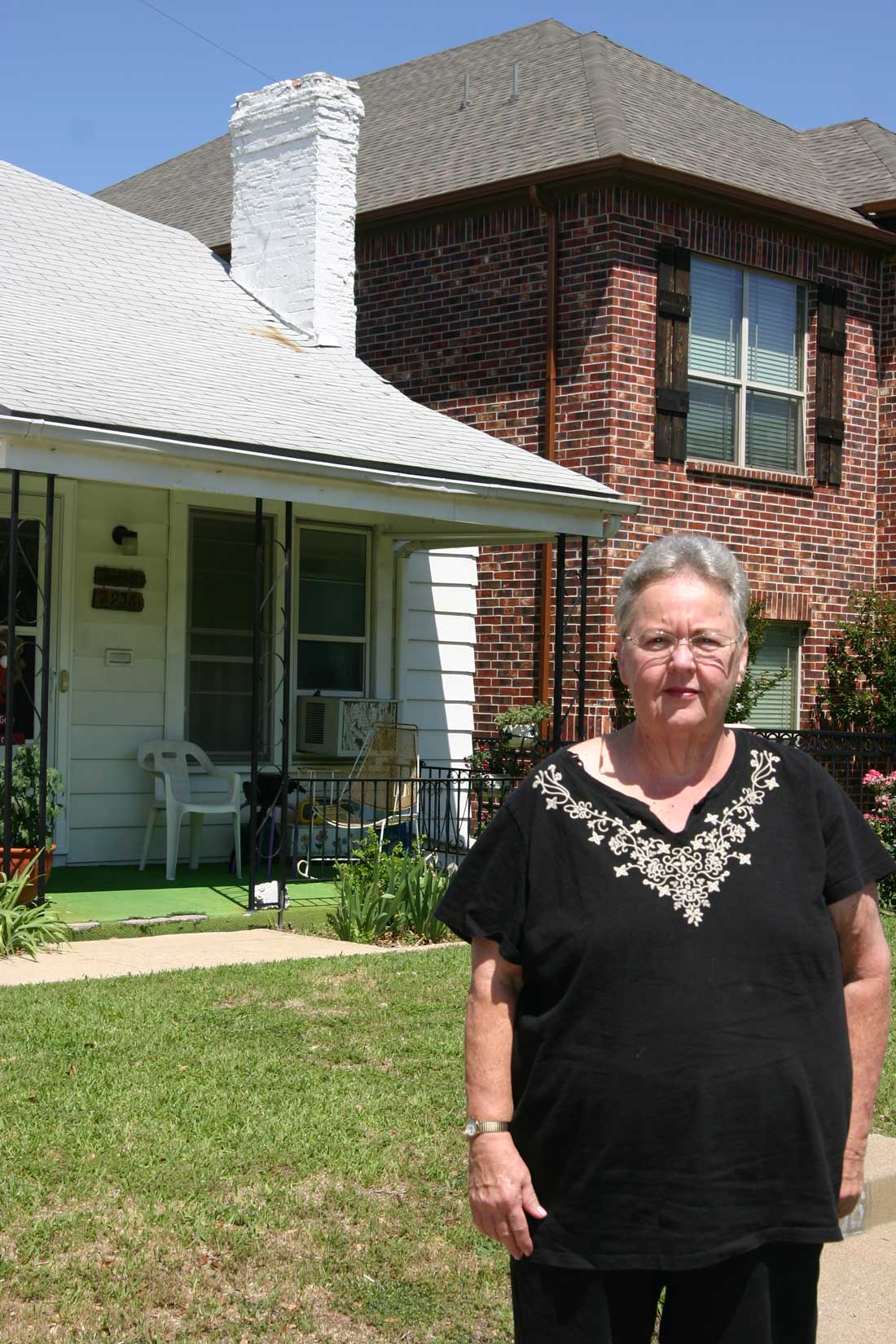Movie critics are hailing Neighbors as this season’s best comedy. A bunch of college kids move into a neighborhood next to regular folks, and raunchy hilarity ensues.
Not so much in real life. Just ask Linda Bridwell. In 1951, her parents bought a house in the Frisco Heights neighborhood east of Texas Christian University. Bridwell is now retired and lives there with her brother.
Six years ago a developer bought two houses next to hers, tore them down, and built a two-story apartment building for students — 18 units’ worth of rambunctious students. The parties began immediately.
“They’d have 50 or 60 cars out here,” she said. “Very loud. They come out on the balconies upstairs and out in the yard, they put tents up in the front yard and party under the tents. It would start at 10 p.m. and go on and on.”
TCU’s enrollment has increased from about 8,000 to 10,000 students since 2000, and developers have been busy converting many single-family homes into rental units, while tearing down others to build apartment complexes.
In the past decade, as a result, Frisco Heights evolved from a quiet neighborhood of old cottages into a sea of apartments catering to students. Residents in surrounding neighborhoods witnessed the transformation, and now they’re taking steps to prevent the same thing from happening to them.
Residents from Bluebonnet Hills and Bluebonnet Place, the neighborhoods just south of Berry Street, have been attending zoning commission meetings to fight a proposal that would allow developers to build a three-story apartment complex just south of the University Drive and Berry Street intersection. After continuing the discussion for several weeks, the commission recommended against the change at last week’s meeting.
The Fort Worth City Council is set to discuss that issue on June 3.
Neighborhood leaders said what they’ve heard from TCU officials worries them even more: that the school will one day require all its undergraduate students to live in campus housing. Currently, the school requires only freshmen and sophomores to live on campus.
“They completely destroyed Frisco Heights, and now TCU is going to pull all the students back on campus,” said Genna Banta, a longtime resident of Bluebonnet Place. “You have all these apartment complexes and duplexes. When TCU pulls its students back, who is going to live there?”
Banta and her husband, Michael, own 11 single-family rental properties in the TCU area, nine of them in their own neighborhood. They have resisted the financial temptation to convert them into apartment complexes.
“Any real estate guide will tell you that inner-city cottage homes have great value, and they’re good for the city,” Genna Banta said.
The couple rents their properties predominantly to students. They worry that moving students back on campus will cause rental prices to drop.
Michael Banta is president of the Bluebonnet Place Neighborhood Association. Members of his group have been attending city meetings on zoning changes and development plans to keep from being surprised by developers.
“Frisco Heights took a hit because they were unorganized politically,” he said. “When you have no opposition at the board of adjustments or the zoning commission, things are often rubberstamped.”
Students are paying up to $1,000 a month for an apartment, he said. Once those students move on campus, that rental money will go to TCU. Residents worry about empty apartment complexes then deteriorating into blighted properties.
Craig Allen, TCU’s director of housing and residence life, has visited with many of the developers. They seek him out to pick his brain about TCU’s plans for future on-campus housing.
Allen disputed the suggestion that TCU is planning to require juniors and seniors to live on campus, although that seems to be a growing preference among students.
“We are continuing to build for juniors and seniors to live on campus,” Allen said. “We expect many juniors and seniors will choose to live on campus as we build that housing. We have huge wait lists for students that want to be on campus.”
The college opened 400 new beds last year, will open 163 more this year, and is renovating other buildings to create another 150 beds. The current count of 4,050 beds is expected to increase to about 4,800 by 2019, he said.
Allen doesn’t think an increase of 750 on-campus beds will have a large impact on the neighborhood apartments. However, as on-campus housing increases over the years, the apartments farthest from the college could notice the effect, he said.
“The developers are overestimating student interest in what they are building, but developers will do what they want to do,” Allen said. “The neighborhoods around TCU are still very nice. Even with the building we are doing, there will still be thousands of students who live off campus. The places right around the college will always be the most popular places for students to live.”
Apartments several blocks away, such as the 18-unit complex next to Bridwell, could see less interest from students.
Success in sports, including a 2011 Rose Bowl victory, helped increase the university’s buzz factor in recent years. But the spike in student enrollment from a few years ago has leveled out.
About half the school’s 8,500 undergrads live off-campus, with most of them settling in rentals in surrounding neighborhoods.
Frisco Heights is bordered by Berry Street, Park Hill Drive, Forest Park Boulevard, and Lubbock Avenue and for decades consisted of modest homes built between the 1920s and 1950s. Most of those homes have been turned into rental units for students or torn down to make way for two- and three-story apartment units. Other properties have been paved for parking lots. Frisco Heights didn’t have an active neighborhood association until the transformation was well under way.
Now the residents are organized and making regular visits to city hall. A couple of years ago, the neighborhood association successfully stopped construction of a proposed five-story apartment complex that would have stretched for an entire block. TCU later bought the property and turned it into a parking lot.
“It’s better than a five-story structure with 600 additional people,” Frisco Heights association president Paula Deane Traynham said.
Michael Banta contacted the area’s city council representative, Joel Burns, two years ago to seek protection from the developers but didn’t get much encouragement. “You can’t stop the free market,” Michael Banta recalled Burns saying.
Frisco Heights got no help or advice from city officials until the neighborhood got organized. After that, “Joel Burns’ office was very helpful. He helped us coordinate meetings with developers,” Traynham said.
The neighborhoods have realized it’s up to them to protect themselves, which isn’t easy since zoning commission and city council meetings often fall on weekday mornings when most people are working.
“The developer only has to show up with an attorney; the neighborhood has to show up en masse,” Genna Banta said.













There are a few points in this article that I feel need clearing up. How can I get in touch with Jeff Prince to address them ?
Martha Jones
Vice President – Bluebonnet Hills
Why not clear them up here?
This is a comment section isn’t it? Go ye forth and comment.
Since when is Michael Banta President of Bluebonnet Place? I don’t recall any election notice or election meeting of any kind. Elliot Carmen was the last elected president and that was years ago. Did Mr. Banta present himself as the president to FW Weekly? Seems to me that since he has numerous rental properties in the neighborhood his views might run contrary to the rest of the homeowners he claims to represent…like me.
Michael Banta said the neighborhood association elected him as president during an official meeting in 2011 and he has continued to serve ever since.
Martha, what were the issues you had with this article? You never elaborated. Please do. Thx.
Yea, I recently moved to the TCU area, so I’m new to it all. There’s nothing anyone can do about partying college students. But I would think a neighborhood association or zoning or whatever could limit the McMansions that take up every inch of property and pack a dozen or more kids into them.
I understand the neighbor’s noise complaints but they’re just an eyesore for the area. I’m rather disappointed with the TCU area and would have imagined a more serene environment, worthy of a nice private school. Berry St has maybe one tree, gas stations and McDonald’s. University Drive is a death trap with no one walking, biking or a single tree, parkway or bike lane. Bluebonnet Circle is maybe the most disheartening, lots of potential there.
We had to move away due to the college students. We had a great home but students moved in next door and threw parties almost every night. They would throw their trash over our fence, urinate in our yard and block our driveway with their cars. We are a young couple and even we couldn’t take it. So sad to lose all the great older homes to “luxury student apartments”. Recently drove by our old home and they had torn down so many houses on our street.
Every neighborhood surrounding TCU is composed of primarily Republicans voters. I moved to Fort Worth in 1951 and it was the same story then. I have a buddy who lived directly across the street from TCU from 1946 until last year. He has suffered hundreds of political yard signs stolen from his front garden. The students attending TCU are primarily Republicans, everyone knows that. Now, the hammer-head wing, the entitled wing of the Republican Party, the trouble makers, are mostly babyTea-Baggers. Here in Fort Worth, and all around Texas, they are as plentiful as fire-ants. When I was a kid, most of the hammer-heads were Democrats. That ceased to be when President Johnson freed the Black folks. . Bigots and greed-heads left the Democrat Party. God bless President Johnson. Most Republicans have a sense of entitlement, whats new here? Most TCU kids are Republicans. TCU should refuse to admit the trouble makers. Do some research, check out the applicants, let the hard-heads and trouble makers go to Baylor.
Benny,
Regardless of your political views the term “tea bagger” is a vile term to use. When you use this kind of language to describe people with opposing political views it shows a complete lack of class. BTW if you do not like the political climate of the area you are welcome to leave, we wont miss you. I hear that Detroit has tons of vacant homes and most people are democrats. Sounds like a town you should look into.